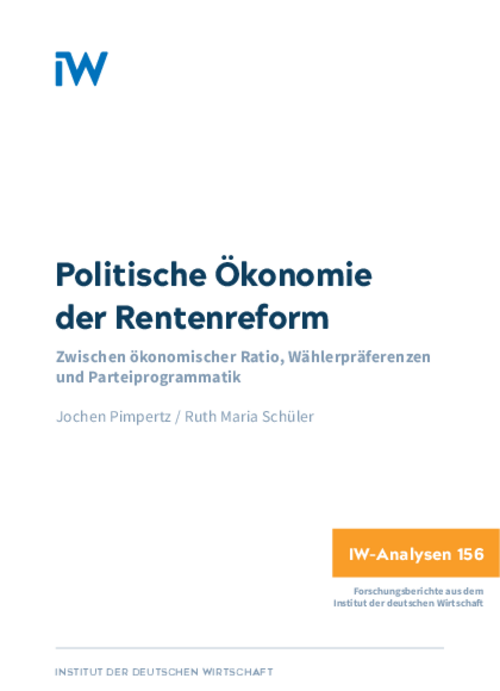As the German population ages, the country’s statutory pension scheme, which is financed on a pay-as-you-go basis, requires higher and higher contributions while the level of pensions is falling.

The Political Economy of Pension Reform: The interplay of economic reasoning, voter preferences and party manifestos

As the German population ages, the country’s statutory pension scheme, which is financed on a pay-as-you-go basis, requires higher and higher contributions while the level of pensions is falling.
This process could be slowed if the retirement age was raised and retirement accordingly postponed. However, the population prefers a constant level of pension benefits and an unchanged retirement age, even if this means an increase in contributions. The pension policies promoted by the political parties seem to orientate themselves on this preference, even though younger contributors are more willing to accept a higher retirement age and smaller pensions. According to the theory of political economy, policymakers can increase their chances of re-election by aligning themselves with the preferences of the median voter. As the latter is, in Germany, 52 years of age and already in the last third of his or her working life, and a majority of voters are aged 50 and over, it can plausibly be assumed that most voters are interested in the most generous pension possible. As the population ages, reforms aimed at stabilising the contribution rate therefore appear politically unattractive. However, this only holds if today’s younger voters begin to favour generous pension payments as they grow older (what is known as the age effect). If, on the other hand, they retain their divergent preferences (the cohort effect), it will become more attractive for political parties to offer sustainable pension reforms in the interests of contributors. As long as it is unclear which effect prevails, it would be helpful for voters if policymakers were challenged to reveal the basis of their decision-making. This would force them to make clear whose distributional interests they are prioritising. How the parties respond would offer voters more guidance in the polling booth than contradictory election promises or a dispute between experts over the fiscal consequences of pension policy.

The Political Economy of Pension Reform: The interplay of economic reasoning, voter preferences and party manifestos

More on the topic

Expenditures and Revenues in Germany’s Statutory Health Insurance
Almost annually recurring deficits in Germany’s statutory health insurance system have led to a steady rise in the contribution rate, a percentage of earned income.
IW
Changing Germany's Statutory Pension Insurance: An Empirical Study of Popular Aversion to Reforms
The demographic transition is putting the German statutory pension insurance system under enormous pressure to reform. Despite widespread concern, no reform of the adjustment mechanisms incorporated into the pension system meets with the approval of a majority ...
IW